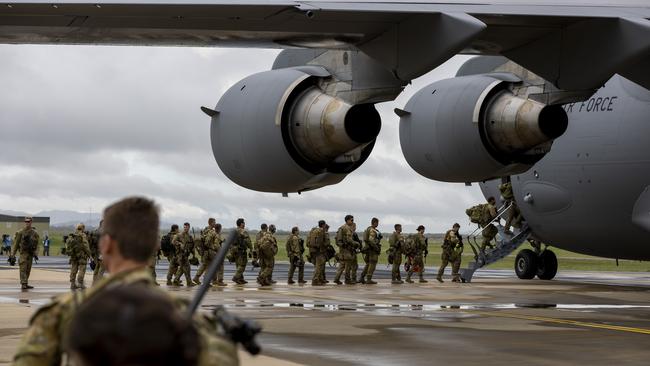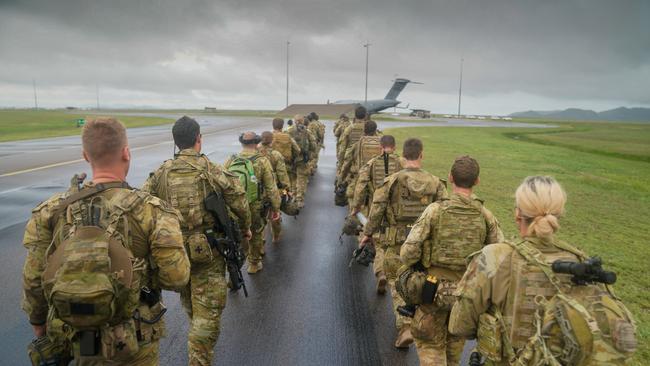‘At some point, we’ve got to get over this’: Royal Commission hears distrust a major barrier to reforms
A landmark inquiry into defence mental health and suicide has heard needed reforms are often kiboshed before they get off the ground.
Policy luminaries say an inquiry into defence and veteran suicide will just be another stack of paper unless systemic change is achieved and – more importantly – the service community can be convinced to trust the process.
The Royal Commission into Defence and Veteran Suicide on Tuesday heard that a deeply ingrained distrust among current and former members of the Australian Defence Force community would always be a significant hurdle to meaningful change across the sector.
Productivity commissioners Richard Spencer and Robert Fitzgerald told the public hearing in Brisbane that this was particularly true for older recruits who, while often agreeing that changes could result in superior conditions, were nonetheless hesitant to let go of the benefits they have.

Mr Spencer and Mr Fitzgerald fronted the inquiry having authored the most recent review into the defence sector and the apparent issues preventing the proper support for current and former servicemen and women.
The pair’s 2019 report – A Better Way to Support Veterans – is one of 23 inquiries made over the past few decades, with their recommendations among 700 so that have been presented to government with little traction.
While in no way blaming defence personnel or veterans, Mr Fitzgerald suggested that the fractured nature of the community meant a consensus on sweeping changes is always going to be a challenge.
“The veterans community is one of the most diffuse organisational communities I‘ve ever struck,” Mr Fitzgerald told commissioners.
“It’s unusual and it‘s dictated by men and women … who see the issues through their particular time in the service, their particular place of deployment, the particular nature of their disability or illness or impairment.

“There‘s a high level of distrust of everybody and everything in the system, which comes as a bit of a shock for somebody coming from outside.”
Mr Fitzgerald stressed that this does not mean Ex-Service Organisations (ESOs) are blind to the benefits of suggested reform and changes.
Rather, he said the battle was often between an aspiration to have a better system, and a fear that they will lose what they already have.
“Every report is met by – particularly older veterans – with the same response: ‘we want all the things that you say are good’, and they totally support our principles.
“But (they also say) ‘actually we don‘t actually want anything much to change, and more importantly, we want all of our benefits to stay exactly as they are, even if the others would be better”.
“Now that‘s not trying to be disrespectful to ESOs, but it is a highly conflicted position when trying to advocate for reform.
“And it‘s a consistent problem. At some point, we’ve got to get over this. You’ve got to convince the veterans community that in fact reform is necessary.”

The 2019 Productivity Commission report met resistance from veterans groups when it suggested a new governance arrangement that promoted “a lifetime wellbeing” focus for veterans.
Mr Fitzgerald and Spencer wrote that the ideal suite of complementary governance reforms would include moving the administration of the veteran support system out of Department of Veterans Affairs into a newly created statutory agency — the Veteran Services Commission – which would levy an annual premium to fully fund the future veteran support system.
Veteran support policy would then be moved into the Department of Defence to create a new Veteran Policy Group, while maintaining a single Minister for Defence Personnel and Veterans.
“If implemented as a package, these reforms would create a unified veteran support system with aligned accountability and incentive structures,” the report reads.

“Responsibility for veterans’ affairs would be centralised into a single portfolio department and VSC’s sole focus would be on administering the veteran support system. This would create clear lines of responsibility and improve strategic direction by balancing Defence’s national security objectives with its duty of care to members.”
Notwithstanding the potential benefits of the reforms, Mr Spencer and Mr Fitzgibbon said there was strong opposition to moving policy responsibility for the veteran support system into the Department of Defence.
Regardless, Mr Spencer maintained the “lifetime wellbeing” focus was a crucial concept in promoting a smoother post-service transition for defence personnel.
“Transition starts day one in your service,” Mr Spencer said.
“The analogy is that sporting bodies have not a dissimilar challenge, in that those individuals are very, very much involved in a way of life. They see it as all consuming. It‘s a passionate purpose in life.
“And I think a lot of sporting bodies and codes have had to understand: how do we prepare those individuals when that moment ends?
“It can end in a planned way of your own volition. It can end overnight.
“That early start to transition – not when it‘s happening – is a critically important part of that process.”


